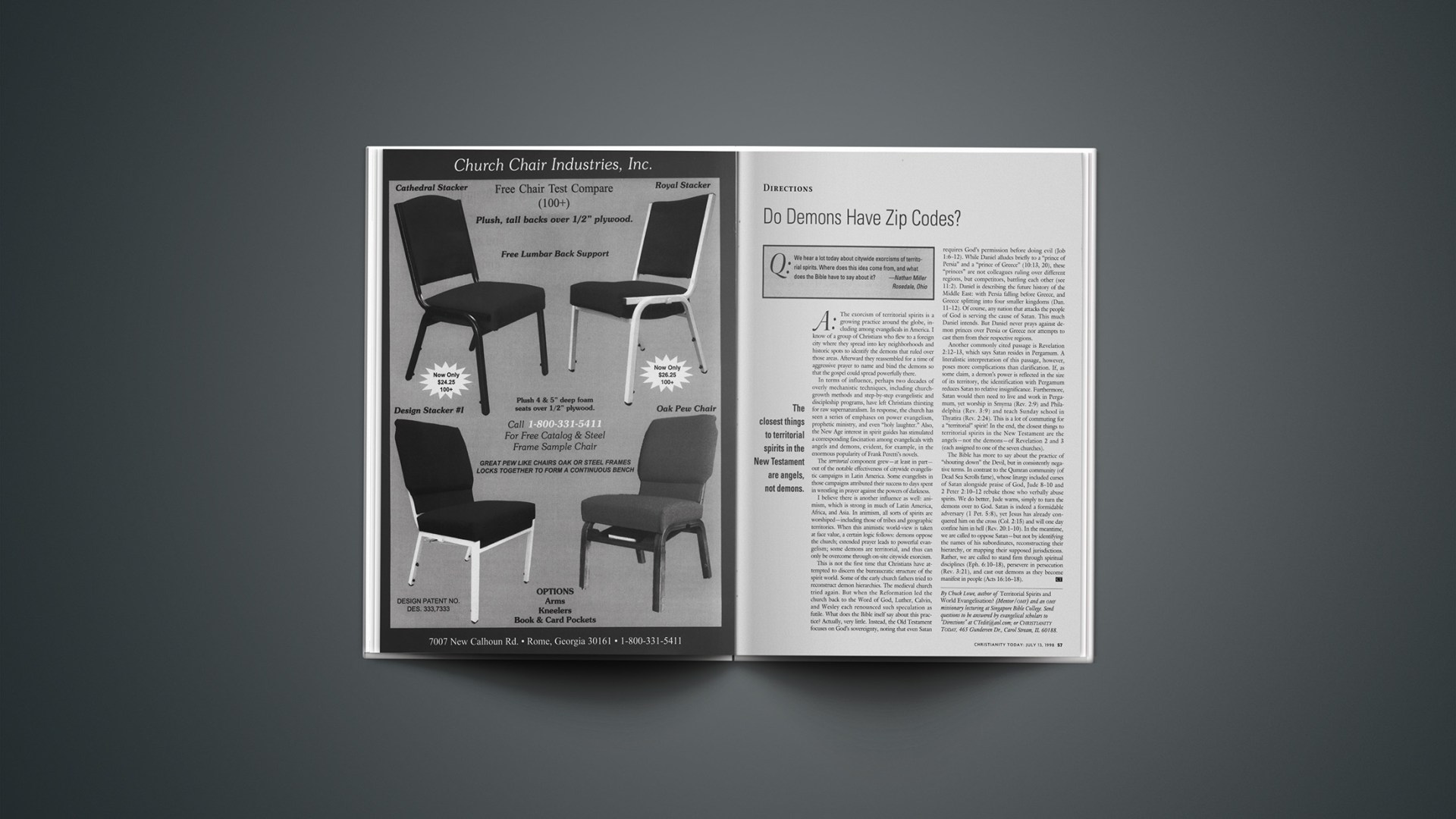Q:We hear a lot today about citywide exorcisms of territorial spirits. Where does this idea come from, and what does the Bible have to say about it?
—Nathan Miller Rosedale, Ohio
A: The exorcism of territorial spirits is a growing practice around the globe, including among evangelicals in America. I know of a group of Christians who flew to a foreign city where they spread into key neighborhoods and historic spots to identify the demons that ruled over those areas. Afterward they reassembled for a time of aggressive prayer to name and bind the demons so that the gospel could spread powerfully there.
In terms of influence, perhaps two decades of overly mechanistic techniques, including church-growth methods and step-by-step evangelistic and discipleship programs, have left Christians thirsting for raw supernaturalism. In response, the church has seen a series of emphases on power evangelism, prophetic ministry, and even “holy laughter.” Also, the New Age interest in spirit guides has stimulated a corresponding fascination among evangelicals with angels and demons, evident, for example, in the enormous popularity of Frank Peretti’s novels.
The territorial component grew—at least in part—out of the notable effectiveness of citywide evangelistic campaigns in Latin America. Some evangelists in those campaigns attributed their success to days spent in wrestling in prayer against the powers of darkness.
I believe there is another influence as well: animism, which is strong in much of Latin America, Africa, and Asia. In animism, all sorts of spirits are worshiped—including those of tribes and geographic territories. When this animistic world-view is taken at face value, a certain logic follows: demons oppose the church; extended prayer leads to powerful evangelism; some demons are territorial, and thus can only be overcome through on-site citywide exorcism.
This is not the first time that Christians have attempted to discern the bureaucratic structure of the spirit world. Some of the early church fathers tried to reconstruct demon hierarchies. The medieval church tried again. But when the Reformation led the church back to the Word of God, Luther, Calvin, and Wesley each renounced such speculation as futile. What does the Bible itself say about this practice? Actually, very little. Instead, the Old Testament focuses on God’s sovereignty, noting that even Satan requires God’s permission before doing evil (Job 1:6-12). While Daniel alludes briefly to a “prince of Persia” and a “prince of Greece” (10:13, 20), these “princes” are not colleagues ruling over different regions, but competitors, battling each other (see 11:2). Daniel is describing the future history of the Middle East: with Persia falling before Greece, and Greece splitting into four smaller kingdoms (Dan. 11-12). Of course, any nation that attacks the people of God is serving the cause of Satan. This much Daniel intends. But Daniel never prays against demon princes over Persia or Greece nor attempts to cast them from their respective regions.
Another commonly cited passage is Revelation 2:12-13, which says Satan resides in Pergamum. A literalistic interpretation of this passage, however, poses more complications than clarification. If, as some claim, a demon’s power is reflected in the size of its territory, the identification with Pergamum reduces Satan to relative insignificance. Furthermore, Satan would then need to live and work in Pergamum, yet worship in Smyrna (Rev. 2:9) and Philadelphia (Rev. 3:9) and teach Sunday school in Thyatira (Rev. 2:24). This is a lot of commuting for a “territorial” spirit! In the end, the closest things to territorial spirits in the New Testament are the angels—not the demons—of Revelation 2 and 3 (each assigned to one of the seven churches).
The Bible has more to say about the practice of “shouting down” the Devil, but in consistently negative terms. In contrast to the Qumran community (of Dead Sea Scrolls fame), whose liturgy included curses of Satan alongside praise of God, Jude 8-10 and 2 Peter 2:10-12 rebuke those who verbally abuse spirits. We do better, Jude warns, simply to turn the demons over to God. Satan is indeed a formidable adversary (1 Pet. 5:8), yet Jesus has already conquered him on the cross (Col. 2:15) and will one day confine him in hell (Rev. 20:1-10). In the meantime, we are called to oppose Satan—but not by identifying the names of his subordinates, reconstructing their hierarchy, or mapping their supposed jurisdictions. Rather, we are called to stand firm through spiritual disciplines (Eph. 6:10-18), persevere in persecution (Rev. 3:21), and cast out demons as they become manifest in people (Acts 16:16-18).
By Chuck Lowe, author of Territorial Spirits and World Evangelisation? (Mentor/OMF) and an omf missionary lecturing at Singapore Bible College. Send questions to be answered by evangelical scholars to “Directions” at cteditor@christianitytoday.com; or CHRISTIANITY TODAY, 465 Gundersen Dr., Carol Stream, IL 60188.
Copyright © 1998 Christianity Today. Click for reprint information.










